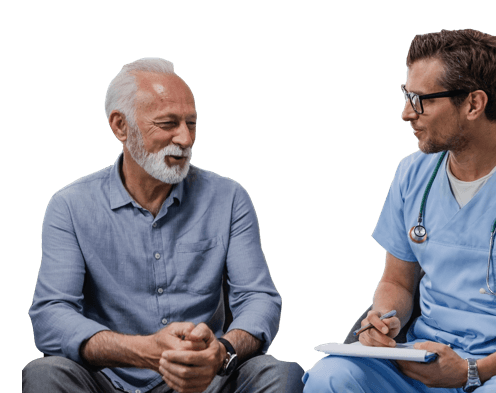Health and Wellness
Actor portrayal
Living With CLL Goes Beyond Treatment
Regardless of where you are on your CLL journey, following good health guidelines such as maintaining a balanced diet, exercising, and taking care of your mental health may be helpful. Be sure to connect with your healthcare team regarding your diet, exercise, and other habits.1
Managing CLL on your own can seem overwhelming, so it may be helpful to
that can support you along the way.
Creating Your Self-Care Regimen
Staying organized and having a plan in place can help alleviate stress and anxiety that might arise while managing your CLL.
Here are 5 things you can discuss with your doctor to help you map out what’s next2:
1
Set a schedule for follow-up exams and tests.
2
Determine other tests you might need in the future, such as early detection (screening) for other types of cancer, or tests to look for long-term health effects from your cancer or its treatment.
3
Discuss possible side effects from your treatment, including what to watch for and when you should contact your doctor.
4
Ask if there are specific diet and activity suggestions or recommendations for other specialists to see such as a dietitian or exercise specialist.
5
Work with your healthcare team to understand the impact that CLL may have on your finances. From treatment to travel-related expenses, assistance may be available from advocacy organizations or the pharmaceutical company that makes your treatment.

Explaining CLL to the People in Your Life
Talking to your friends and family about CLL can be difficult. You may have a diagnosis, but have not started treatment and are not showing any symptoms. You may know others living with cancer whose experience is very different. If you feel conflicted or confused, know that your response is natural and that you are not alone.3
Here’s a step-by-step plan you can follow to help you prepare for more comfortable conversations about your CLL3:
Come to Terms With Your Own Feelings
The most important thing is how you feel. Remember that it’s OK to go through all of the emotions that having CLL may bring up for you.
Make a List of Who You Want to Tell
It may seem like a simple task, but jotting down who you want to talk to about your CLL may be helpful for you. You may have different relationships with friends, family, and coworkers, so your comfort levels may vary.
Consider Whether You Need Extra Help
Some people may choose to talk with a support group, counselor, or therapist, not only about their concerns, but also to learn about how other people with CLL speak to those closest to them.
Have Links and Resources Ready
If you are uncomfortable sharing the details of your condition, you can refer those you care about to this website to learn more about CLL.
Focusing on Overall Health
Regardless of your age or where you are on your journey with CLL, making healthy choices—big or small—may help you feel better day-to-day. Talk to your doctor about any changes in your diet or exercise program.
Here are some positive shifts to consider4:
- Eliminate tobacco use
- Limit alcohol consumption
- Reduce fat, salt, and sugar intake
- Eat a balanced diet including fruits and vegetables
- Replace sodas with seltzer or teas
- Drink plenty of water
- Keep moving—before, during, and after treatment
- Exercise with a friend to help keep you accountable
- Get enough sleep—take naps if you need to
- Consider using a digital app to keep track of your healthy habits
Ask your healthcare team what they would recommend to help manage your CLL.
Dealing With Stress
Stress and anxiety are common with a cancer diagnosis. You should discuss these feelings with your doctor, who may recommend speaking to someone who specializes in assisting people with stress and/or anxiety. This provider may be able to recommend additional activities and methods for addressing these feelings. There are many activities that may help reduce and relieve these feelings. Remember to talk to your doctor before beginning any new exercise program.5
Examples of Stress-Relieving Activities
Yoga
By helping you focus on breathing and posture, yoga can bring relaxation and help reduce fatigue.6
Meditation
The simple act of taking a breath can increase energy levels and bring about a sense of mindfulness that may be helpful with making decisions.7
Walking
Getting away from screens and devices and back to nature could have a calming effect on your overall mood and help you see things more clearly.7
Talking
Talking with a friend, family member, support group, counselor, or therapist to share your thoughts and feelings about CLL or anything else that's on your mind may be helpful.8
Journaling
Journaling can be a great way to process your thoughts and emotions, especially if you don't feel comfortable sharing certain feelings with family or friends.9
Hobbies
Doing the hobbies you love—alone or with others—can help you pour energy into activities that are fun and comforting and help take the focus off CLL.8
Sign up to stay informed about CLL
Prepare for doctor
visits with a
discussion guide


